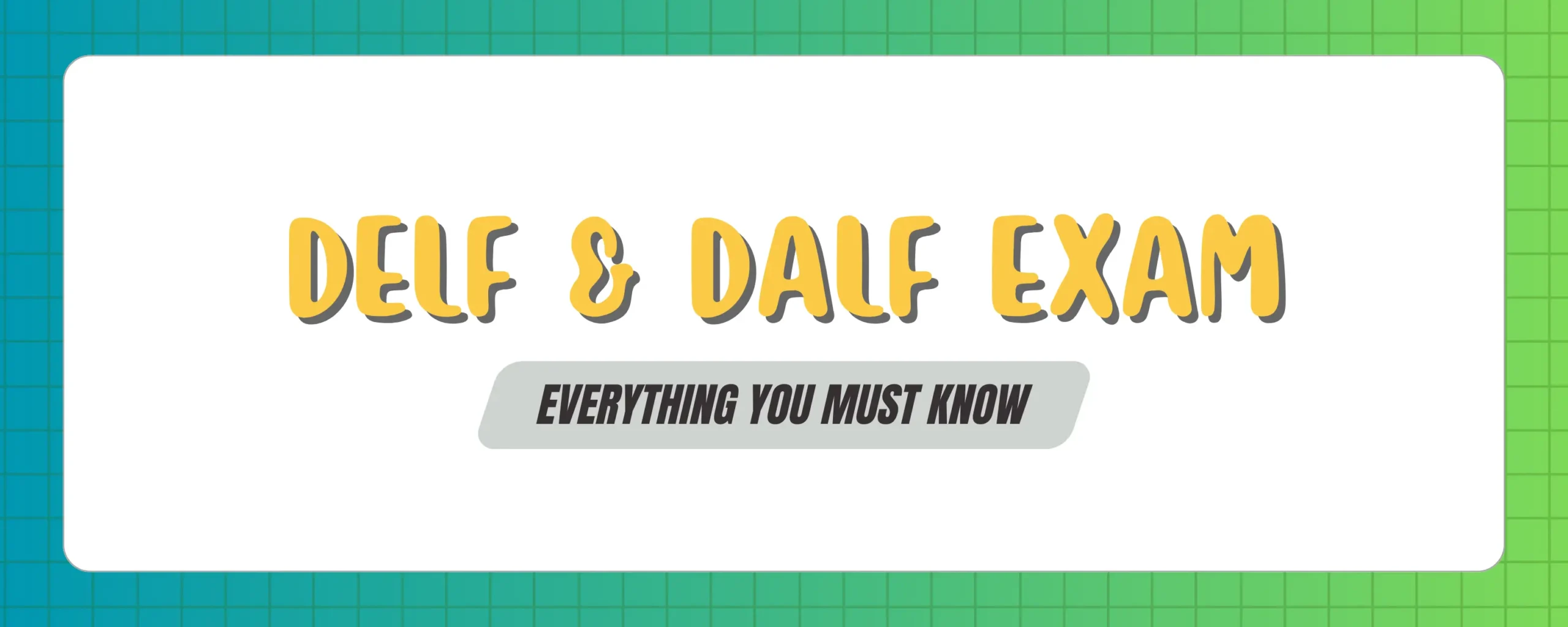Whether you aspire to study in France, work in a French-speaking environment, or simply expand your linguistic horizons, the DELF and DALF exams are invaluable tools for assessing and validating your French proficiency.
What are DELF and DALF Exams?
DELF (Diplôme d’Études en Langue Française) and DALF (Diplôme Approfondi de Langue Française) are internationally recognized language proficiency exams for the French language. They are administered by the French Ministry of Education and evaluate the language skills of non-native speakers.
Here are some key details about DELF and DALF exams:
- Levels: The DELF and DALF exams are divided into six levels, which correspond to the Common European Framework of Reference for Languages (CEFR):
- Exam Structure: DELF and DALF exams assess the four language skills: listening, speaking, reading, and writing. Each skill is evaluated separately in different exam components.
- Listening: Candidates listen to audio recordings and answer comprehension questions.
- Speaking: Candidates engage in a conversation with an examiner and complete various speaking tasks.
- Reading: Candidates read texts and answer comprehension questions.
- Writing: Candidates write essays or reports based on given prompts.
- Exam Duration: The duration of each exam varies according to the level. Generally, the exams take around 1.5 to 4 hours to complete.
- Certification: After completing the exams, candidates receive a diploma indicating their level of proficiency. The diplomas are valid indefinitely and do not expire.
- Recognition: DELF and DALF diplomas are internationally recognized and accepted by many educational institutions, employers, and government organizations as proof of French language proficiency. They are widely used for academic and professional purposes.
- Preparation: Candidates can prepare for DELF and DALF exams through self-study using official preparation materials such as textbooks, sample papers, and online resources. It is also advisable to take preparatory courses or work with a language tutor to enhance their skills.
- Exam Availability: DELF and DALF exams are conducted at authorized examination centers like Alliance Française worldwide. These centers are typically affiliated with French embassies, language institutes, or educational institutions. It is important to check the exam schedules and registration deadlines for each center.
Taking the DELF or DALF exam can be a valuable step for individuals who want to demonstrate their French language proficiency for academic, professional, or personal reasons. It is advisable to consult the official DELF-DALF website or contact examination centers for the most up-to-date information regarding exam dates, fees, and registration procedures.
DELF Exams for Children
In addition to the standard DELF and DALF exams, there are two specialized versions designed for younger learners: DELF Prim and DELF Junior. Here’s some information about each of these exams:
- DELF Prim
- Target Audience: DELF Prim is specifically designed for children aged 8 to 12 years old who are learning French as a foreign language.
- Levels: DELF Prim is divided into three levels:
- DELF Prim A1.1: Beginner level
- DELF Prim A1: Elementary level
- DELF Prim A2: Pre-intermediate level
- Exam Structure: The exam evaluates the four language skills (listening, speaking, reading, and writing) using age-appropriate tasks and materials.
- Certification: Upon successful completion of the DELF Prim exam, candidates receive a diploma indicating their level of proficiency.
- DELF Junior
- Target Audience: DELF Junior is intended for young learners aged 12 to 18 years old who are studying French as a foreign language.
- Levels: DELF Junior consists of four levels:
- DELF A1 Junior: Beginner level
- DELF A2 Junior: Elementary level
- DELF B1 Junior: Intermediate level
- DELF B2 Junior: Upper-intermediate level
- Exam Structure: The exam assesses the same language skills as the standard DELF exam but with content and tasks adapted for younger learners.
- Certification: Successful candidates receive the DELF Junior diploma, which is equivalent in value to the regular DELF diploma.
Both DELF Prim and DELF Junior exams aim to provide a comprehensive evaluation of young learners’ French language proficiency. They offer an opportunity for children and teenagers to obtain an internationally recognized certification that can be beneficial for their academic and personal development.
How to Register for DELF – DALF Exams in India
To register for the DELF exam in India, you can follow these general steps:
- Find an Authorized Examination Center: Identify the authorized DELF examination center (Alliance Française) in your city or region. These centers are typically affiliated with French institutes, language schools, or educational institutions. You can search online or contact the French Embassy or Consulate in your area for a list of authorized centers.
- Check Exam Dates and Levels: Visit the official website of the examination center or contact them directly to inquire about the upcoming exam dates and available levels. DELF exams are usually held multiple times throughout the year.
- Understand Registration Requirements: Familiarize yourself with the registration requirements, including any specific documents or information needed for the registration process. This may include a valid identification document (such as a passport or ID card), passport-sized photographs, and proof of payment.
- Complete the Registration Form: Obtain the registration form from the authorized examination center or download it from their website. Fill in the required details accurately and legibly. Make sure to indicate the level of the exam you wish to take (e.g., DELF A1, DELF B2) and any optional components (e.g., speaking test).
- Submit the Registration Form: Submit the completed registration form along with any required documents and the examination fee to the authorized examination center. Some centers may accept online registration, while others may require in-person submission. Follow the specific instructions provided by the examination center.
- Pay the Examination Fee: Pay the examination fee as per the instructions provided by the examination center. The fee can usually be paid in cash, through a bank transfer, or via other accepted payment methods. Keep the payment receipt or proof of payment for reference.
- Confirmation and Admit Card: After registering and paying the fee, you will receive a confirmation of your registration from the examination center. Closer to the exam date, you will typically receive an admit card or confirmation email containing important details such as the exam date, time, venue, and any specific instructions for the exam day.
It’s important to note that the registration process and requirements may vary slightly depending on the authorized examination center. Therefore, it is recommended to contact the specific center where you plan to take the exam to get precise instructions and the most up-to-date information regarding registration procedures.
Why Should one get a DELF or DALF Certificate?
Obtaining a DELF or DALF certificate can offer several benefits and advantages.
- Academic Recognition: DELF and DALF certificates are internationally recognized and respected as proof of French language proficiency. They can be beneficial for students who want to study at French-speaking universities or institutions that require a certain level of French language skills for admission.
- Professional Advancement: Having a DELF or DALF certificate can enhance your job prospects, especially if you are seeking employment opportunities where knowledge of the French language is valued or required. It can demonstrate your commitment to learning French and your ability to communicate effectively in a professional context.
- Study or Work Abroad: If you plan to study or work in a French-speaking country, a DELF or DALF certificate can be useful for visa applications and demonstrating your language skills to potential educational institutions or employers.
- Personal Development: Learning a foreign language like French can broaden your horizons, improve your cognitive abilities, and increase your cultural understanding. Working towards a DELF or DALF certificate can provide a structured framework for language learning and motivate you to continuously improve your French skills.
- Self-Confidence: Successfully passing the DELF or DALF exams and obtaining a certificate can boost your self-confidence in your language abilities. It validates your efforts and achievements in learning French, providing a sense of accomplishment and motivation to further develop your language skills.
- Networking Opportunities: DELF and DALF certificates can connect you with a global community of French language learners and speakers. They demonstrate your commitment to French language learning and can open doors to networking opportunities with individuals who share a similar passion for the French language and culture.
- Personal Fulfillment: Achieving a DELF or DALF certificate can be a fulfilling and rewarding experience. It represents a tangible recognition of your dedication, hard work, and progress in learning French, allowing you to communicate more effectively with French speakers and fully enjoy the richness of the French language and culture.
How to Prepare for DELF and DALF Exams
Preparing for DELF and DALF exams requires a structured and comprehensive approach to develop your language skills. Here are some tips to help you prepare effectively:
- Understand the Exam Format: Familiarize yourself with the structure, duration, and requirements of the exam. Review sample papers, past exams, and official guidelines to gain a clear understanding of what to expect in each section.
- Assess Your Current Level: Determine your current proficiency level in French using self-assessment tools, mock exams, or by seeking feedback from a language teacher or tutor. This will help you identify your strengths and weaknesses and create a targeted study plan.
- Set Clear Goals: Set specific goals for each language skill (listening, speaking, reading, and writing) based on the CEFR levels and the requirements of your desired DELF or DALF exam. Create a study schedule with milestones to track your progress.
- Use Official Study Materials: Utilize official preparation materials provided by the examination authorities. These materials often include textbooks, sample papers, practice exercises, and audio recordings. They are specifically designed to align with the exam requirements and can give you a good idea of the exam’s style and content.
- Enhance Vocabulary and Grammar: Focus on expanding your vocabulary and improving your grammar skills. Regularly practice using new words, phrases, and grammatical structures in context through reading, writing, listening, and speaking activities. Use vocabulary-building resources such as flashcards, online word lists, or mobile apps.
- Practice Past Exam Papers: Solve past exam papers to become familiar with the format and types of questions asked in the DELF or DALF exams. This will help you develop time management skills, improve your understanding of exam instructions, and identify areas that require additional practice.
- Improve Listening Skills: Listen to French audio materials such as podcasts, radio programs, songs, or movies to enhance your listening comprehension. Practice extracting key information, understanding different accents, and identifying main ideas, supporting details, and specific information.
- Enhance Reading Skills: Read a variety of French texts, including newspapers, magazines, books, and online articles. Pay attention to comprehension, vocabulary, and understanding the structure and organization of the text. Practice summarizing and extracting information from the readings.
- Develop Speaking Skills: Practice speaking French regularly to improve your fluency, pronunciation, and communication skills. Engage in conversations with native speakers, join language exchange programs, or work with a language tutor. Practice common speaking tasks such as describing people, expressing opinions, and giving presentations.
- Improve Writing Skills: Enhance your writing skills by practicing different types of written tasks, such as essays, reports, letters, and summaries. Pay attention to proper grammar, vocabulary usage, organization, and coherence. Seek feedback from a language teacher or native speaker to improve your writing style.
- Simulate Exam Conditions: As you get closer to the exam date, simulate exam conditions by setting a timer and practicing under timed conditions. This will help you build stamina, improve your speed, and adapt to the time constraints of the actual exam.
- Seek Guidance and Feedback: Consider working with a language tutor, enrolling in preparatory courses, or joining study groups to receive guidance, feedback, and additional practice opportunities. They can provide valuable insights, correct mistakes, and offer tips specific to the DELF and DALF exams.
Remember to practice regularly, stay motivated, and track your progress throughout your preparation journey. With consistent effort and targeted practice, you can enhance your language skills and increase your chances of success in the DELF or DALF exams.







